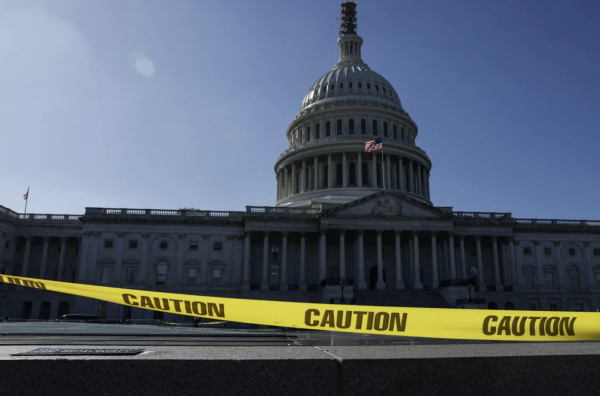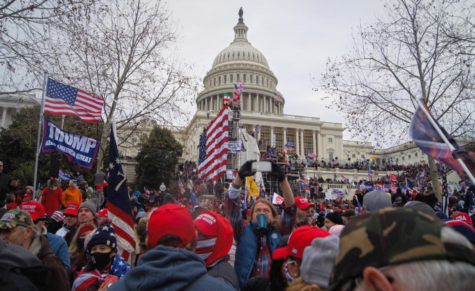United States pulls out of the Intermediate-Range Nuclear Forces Treaty
Former French President, Charles De Gaulle, once said, “Treaties are like roses and young girls; they last while they last.” It seems De Gaulle was correct; since its inauguration in 2017, the Trump administration has pulled out of the Iran nuclear deal, the Paris climate accord, and has threatened to leave the North Atlantic Treaty and World Trade Organizations. Recently, President Trump announced that the United States was pulling out of the Intermediate-Range Nuclear Forces (INF) Treaty, an arms control agreement symbolizing the end of the Cold War, and speculation about what the withdrawal will mean for international safety and security has begun.
The INF Treaty has been in force for three decades thus far. Its signing was a crucial moment in the Cold War, eradicating more than 2,600 missiles total, along with their corresponding launchers, and ending the standoff with nuclear missiles in Europe.
President Trump explained the decision to leave the INF Treaty, claiming Russia has been in violation of the treaty since 2014. The Trump administration believes Russia’s violations put the United States at a military disadvantage to, not just Russia, but also China, a nation not signatory to the treaty. The Obama administration first accused Russia of violating the treaty through the testing of a new missile, and weeks after Donald Trump’s inauguration, the Pentagon said Russia had actually deployed that weapon.
“We cannot be the only country in the world unilaterally bound by this treaty, or any other,” President Trump said in a statement released by the White House. Alongside Russia’s violations in developing a new intermediate-range missile, the Novator 9M729, and China’s looming threat of growing nuclear arsenal, upper school history teacher Nathan Vigil believes there is a third reason leading to the United States pulling out of the INF Treaty relating to the NATO Alliance that provided a counterpoise to the Soviet-led Warsaw Pact and eventually won the Cold War.
“The Trump administration has little regard for the NATO Alliance, an alliance that expended enormous political and diplomatic capital to negotiate the INF Treaty for the sake of Europe’s security” said Vigil.
Russia denies the allegations made against them, and, in turn, accused the United States of violating the INF Treaty through its missile defense systems in Europe, which the State Department rebutted.
President Trump, in October, threatened with his intent to leave the deal, in hopes that Russia would be convinced to change its course and comply with the treaty. However, the recent announcement of the withdrawal from the INF Treaty signals the six-month notice to the final U.S. withdrawal, leaving little time for Russia to end missile programs seen as a violation and salvage the treaty.
The United States intends to suspend their obligations, moving forward with the development of military response options, but the withdrawal will not be final until August. Until then, the United States will wait to determine whether Russia will remain in infringement of its treaty obligations not to produce, possess, or flight test a ground-launched, intermediate-range cruise missile system with a range between 500 and 5,500 kilometers. However, following the announcement, President Vladimir Putin announced that Russia would follow suit in suspending their participation in the INF treaty as well.
“It signals a shift in the willingness to have conversation. When your names are down on paper, as agreeing to something, then there is some level of obligation, whether or not you stick to it, to have conversation, to have civil discourse around what weaponry exists and what its function is,” said upper school history teacher Laura Drewicz Ewing. “If you take your name off that piece of paper, then you’re no longer obligated, even by public opinion, to have conversations, and it makes it much more likely that the conversation becomes about use of force.”
Regarding the announcement, differing opinions exist on whether the withdrawal was the correct choice for the United States security. Some believe remaining in the treaty while Russia continues to violate its conditions and manufacture deadly missiles threatens our nation’s safety, while others worry pulling out from the treaty will lead to a dangerous arms race and another Cold War.
According to Michael Birnbaum, NATO Security General Jens Stoltenberg backed up the U.S. move and advocated that it was Russia’s responsibility to again comply with the treaty.
On Twitter, Stolenberg wrote, “Russia is in material breach of the #INFTreaty & must use next 6 months to return to full & verifiable compliance or bear sole responsibility for its demise. #NATO fully supports the US suspension & notification of withdrawal from the Treaty.”
Many people view remaining in the treaty unfair, given that Russia has not been following the content of the treaty. Senator Lindsey Graham was among the many believing the United States should stop assuming that other nations will act with integrity the way the U.S. does.
“I completely support the Trump Administration’s decision to withdraw from the Intermediate-Range Nuclear Forces Treaty due to Russian noncompliance,” Senator Graham similarly said in a statement. “It’s a bad deal for America when Russia cheats and the United States complies.”
Russia’s neighboring states such as Azerbaijan, Moldova, Tajikistan, Northern Caucasus, Crimea, Syria, Ukraine, and Georgia have all seen annexation, occupation, or significant Russian military might since the signing of the INF Treaty. Because of this, senior Katherine Hennessy believes the United States was justified in withdrawing from the treaty.
“Russia attempts to bully its neighboring states into submission while hoping that people in non-global super powers in NATO and the EU with political agendas and high-minded ideals will act with unwarranted restraint because they are not responsible for their own protection, having given up that responsibility to the U.S. many years ago” said Hennessy. “The treaty allows unscrupulous countries to take advantage of the U.S.’s commitment to our word and treaties.”
Rather than supporting the United States leaving the INF Treaty because Russia’s violations seem unfair, a similar opinion supports the United States backing out because, given Russia’s violations, the Treaty has been proven ineffective.
“As of now, I don’t think the U.S. and Russia’s suspension of the INF Treaty necessarily signifies the beginning of a new arms race or a looming nuclear war,” said senior Drew Norman. “Russia has been making ballistic missiles with the ability to reach parts of Europe and Asia, and therefore, has been violating the treaty since at least 2014, so it wasn’t extremely effective anyways.”
Hennessy has a similar perspective that withdrawing from the INF treaty shouldn’t result in a nuclear arms race given the amount of weaponry already in possession of both the United States and Russia. In addition, the treaty did not address certain missiles, as their technology was not relevant at the time the treaty was made.
“As the INF doesn’t cover long-range missiles or land or air deployed intermediate and short-range missiles, the idea that withdrawing would lead to a nuclear arms race is a little ridiculous” said Hennessy. “Both Russia and the US have enough weapons to destroy the world a few times over.”
However, House Speaker Nancy Pelosi was among those in belief that the withdrawal from the INF Treaty was not without serious consequences.
“The Trump Administration is risking an arms race and undermining international security and stability,” said Pelosi in a statement, “Russia’s brazen noncompliance with this treaty is deeply concerning, but discarding a key pillar of our nonproliferation security framework creates unacceptable risks.”
Unease about the withdrawal is not limited to within the United States. The INF Treaty plays a prominent role in Europe’s security strategy, thus many European diplomats articulated opinions on the subject. German Foreign Minister Heiko Maas was one who expressed his opposition to the idea.
Mass called the withdrawal “a regrettable move” in an interview with Alex Ward. “the treaty is “an important pillar of our European security architecture” and that the US decision “raises difficult questions for us and Europe.”
Security after the withdrawal from the INF Treaty is also an issue for Russia. If the United States once again deploys medium-range missiles in Europe, Russian leaders will have limited amounts of time to decide if they’re really under attack and may be tempted to launch pre-emptive nuclear strikes.
“If Russia takes the collapse of the treaty as an excuse to begin deploying large numbers of intermediate-range nuclear forces and targeting them at Europe, this will significantly weaken Europe’s security” said Vigil.
In an interview with Lucian Kim, defense analyst Aleksandr Golts stated his opinion that consequences of the abandonment of the INF Treaty for Russia are catastrophic. Golts believes Russia will end up in the same situation they were in at the beginning of the 1980s, specifically in the range of missiles that can hit major Russian population centers within a flight time of six to eight minutes.
“Putin is not in a place where he wants to be,” said Golts, according to Kim. “He thought he could get away with some minor violations without the U.S. tearing up the entire agreement.
Should the INF Treaty end its course in August, only one major nuclear weapons treaty will still hold the U.S. and Russia. With the death of the INF Treaty, questions have begun to arise about the future of the New START pact. This pact limits the deployed strategic nuclear warheads of Russia and America. Set to expire in two years, talks have not yet begun on a renewal.
“I truly fear that the New START treaty may have the same fate as the INF Treaty,” Russian Deputy Foreign Minister Sergei Ryabkov said on Russian television. “It may just expire on February 5th, 2021, and not be prolonged.”
Other upcoming political events, such as the 2020 presidential elections, may play a role in negotiations for the New START treaty, and concerns exist on how separate issues such as President Trump’s need to prove that he did not collude with Russia in the 2016 election will affect Russia and the United States reaching an agreement with the New START treaty.
“The 2020 presidential election is not going to allow for a lot of nuance. Both sides are going to try to oversimplify their opponent’s arguments and paint themselves as the only side that can be trusted on national security issues,” said 9th grade chair and upper school history teacher John Monahan. “I think that President Trump may use the negotiations to point to sanctions or bring up pulling out of the INF Treaty in a way that says he is not overly trusting with Vladimir Putin, and I think the New START treaty will be in jeopardy if it gets so politicized.”
The current convoluted state of U.S. and Russia relations paired with both nations leaving the INF Treaty calls into question the future security of our nation and many others around the globe. August, most likely, will bring the end of the INF Treaty, and by 2021, the U.S. and Russia may no longer have limitations restricting nuclear weapons. A variety of opinions remain on the U.S. withdrawal, but, regardless, safety remains prominently in the minds of those in the media and government, as well as those at Westminster.






